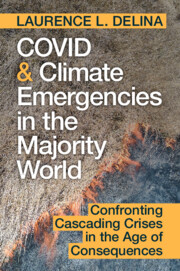 COVID and Climate Emergencies in the Majority World
COVID and Climate Emergencies in the Majority World Book contents
- COVID and Climate Emergencies in the Majority World
- Reviews
- COVID and Climate Emergencies in the Majority World
- Copyright page
- Dedication
- Contents
- Preface
- Acknowledgements
- 1 Portrait of a Grief
- 2 Collapsing Dominoes
- 3 Vulnerabilities Amplified
- 4 Walled World
- 5 Obscene Opulence
- 6 Climate Nationalism
- 7 Toggling the System
- 8 Decluttering Consumption
- 9 Confronting Neo-Liberalism
- 10 Ceasing Arrogance
- 11 Making Amends
- 12 Collective Solidarities
- 13 Decolonising from Within
- 14 Indigenous Epistemology
- 15 Communicating Risks
- 16 The Hubris of Control
- 17 Mobilising the 3.5 Per Cent
- Index
- References
16 - The Hubris of Control
Published online by Cambridge University Press: 22 June 2023
- COVID and Climate Emergencies in the Majority World
- Reviews
- COVID and Climate Emergencies in the Majority World
- Copyright page
- Dedication
- Contents
- Preface
- Acknowledgements
- 1 Portrait of a Grief
- 2 Collapsing Dominoes
- 3 Vulnerabilities Amplified
- 4 Walled World
- 5 Obscene Opulence
- 6 Climate Nationalism
- 7 Toggling the System
- 8 Decluttering Consumption
- 9 Confronting Neo-Liberalism
- 10 Ceasing Arrogance
- 11 Making Amends
- 12 Collective Solidarities
- 13 Decolonising from Within
- 14 Indigenous Epistemology
- 15 Communicating Risks
- 16 The Hubris of Control
- 17 Mobilising the 3.5 Per Cent
- Index
- References
Summary
Many responses to the COVID-19 pandemic and all other crises, including the climate catastrophe, are motivated by the belief that one can ‘control’ the course of events. But control is not only a fallacy: it is a hubris. What is needed, instead, are options that are considerate, mutualistic, and diverse in character, as well as those that take group capabilities into account.
- Type
- Chapter
- Information
- COVID and Climate Emergencies in the Majority WorldConfronting Cascading Crises in the Age of Consequences, pp. 135 - 146Publisher: Cambridge University PressPrint publication year: 2023
